2022 has been a rollercoaster year for the sales profession. From a rampant boom in tech sales that’s caused sales comp to rise by up to 30% to a startup bust that’s caused thousands of salespeople to restart their job hunt, navigating the sales profession has become more complicated than ever.
According to Crunchbase’s layoff tracker, literally hundreds of tech companies have laid off some percentage of their staff, with an average percentage of staff affected well over 15%.
Obviously, this makes for a daunting time to look for a job, whether you’re trying to break into sales for the first time, or just beginning your search for your next sales job. That said, things aren’t nearly as dire as they seem. The economy remains strong, sales roles are essential in an economic slump, and as our CEO will tell you, starting your sales career in a downturn isn’t necessarily a bad thing.
That’s why we wrote a definitive guide to finding a sales job in 2022, with all of the up-to-date data and pro sales tips to take your job search to the next level.
How to get a sales job with no experience in 2022
Getting started
So you’ve decided to break into sales. Congratulations! You’ve put yourself on a path to a rich and rewarding career. Before you begin your sales job hunt however, you should take some time to become acquainted with the sales profession as a whole.
Some sales jobs require truly no experience or prior knowledge at all, but these aren’t likely to be sales jobs that leave you with an extremely *positive* perception of sales jobs. So do your research! Learn the ins and outs of sales as a profession. Learn about the structure of a sales team. Read about the duties and responsibilities of a sales development representative, the most common entry-level sales role.
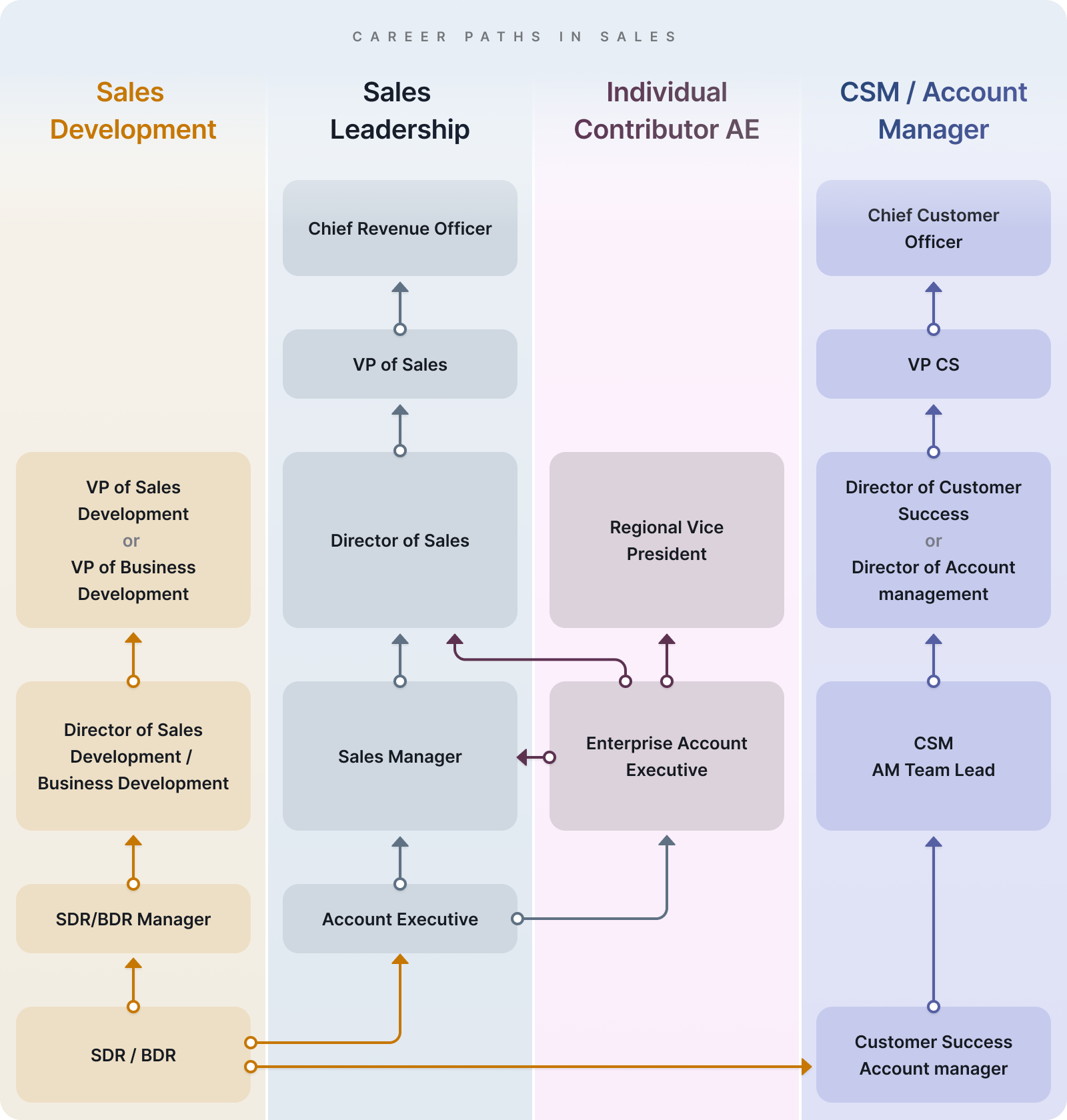
Sales is a high stress career with high rewards, both financial and personal. Ask yourself, is this the career I want? Better to decide now than join a sales team and burn out three months in.
Do Your Research
Once you’ve scheduled your first interviews, you need to come prepared.
Companies spend months onboarding salespeople, so you aren’t expected to be ready to nail the role, but get acquainted with the company and what they sell. As a seller with no experience, you’ll go a long way towards landing your first sales role by showing you’re more prepared than the competition.
Understand the company’s value proposition. Research competitors and ask about the competition. Research your interviewer and ask them about their experience selling. Showing you’re able to turn a cold conversation into an informed discussion will go a long way towards showing you’ve got what it takes to sell.
Sell Yourself

So you’re trying to break into sales with no experience. Here’s the bad news: sales is a career that can take years or even decades to fully master.
Here’s the good news: Sales managers are only interested in hiring a person they are convinced can sell, and plenty of experienced sellers can’t. That means that you have the entire sales interview to convince them you’re the best possible option for boosting revenue.
And guess what? The sales interview process is an almost perfect one-to-one test of the key sales skills you’ll need to succeed in your role. Whereas a job interviewer might not fully be able to test the written communication skills of a copywriter, the sales interview process utilizes every skill of a salesperson, from their ability to research, to objection handling, to keeping the conversation going, to ultimately, closing.
So treat breaking into sales like it’s your first sales crucible. Prospect for jobs you feel you have the best chance at to maximize your time. Practice your outreach skills on applying to jobs you want. Leverage connections to build leads at companies where you have a contact. It might not be easy, and it might take some time, but just like in sales, you can get 99 nos, but it only takes one yes.
Understanding the Interview Process
To the previous point, the sales interview process is a little more involved than your traditional interview. Whereas in a traditional interview, you’ll meet with 2-3 key stakeholders, share some of your past work, and discuss the needs of the role, a sales interview is a much more rigorous test of your sales skills.
As we mentioned, onboarding for a sales role can take up to three months, so hiring the right person is incredibly important. For this reason an interview can include up to five rounds, starting with a simple phone screen and working up to a practice pitch of the company’s product, followed by a meeting with a high level figure like an AE or a VP of Sales.
A more thorough breakdown of the sales interview process can be found here, but suffice it to say, if you want to break in: Come prepared, come polished, come ready to sell.
Do’s and Don’ts of Breaking into Sales
DO: Sell your transferable skills
In one sense or another, almost every meaningful pursuit in life involves sales skills. So show the recruiter you can sell by translating your life experience into the language of sales. Getting into sales from a marketing background? Talk about how your communications skills allow you to nurture leads until they’re begging to buy. Looking for your first sales job after a collegiate basketball career? Talk about how you’ve built skills that allow you to take crushing losses and come back twice as focused.
Tell your story, sell yourself, and you’ll have already gone a long way in showing you’re ready to hit the phones.
DO: Follow up
It might seem small, but following up and thanking your interviewer is crucial to breaking into sales because it shows a) your positive attitude, and b) your ability to nurture leads. In a job hunt, you’re going to lose out on countless jobs for reasons outside of your control, so don’t miss a great opportunity to advance your case in a way that is very easily within your control.
DON’T: Lie
Maybe you’re coming to sales from an industry with looser expectations of employee honesty, but we’re here to let you know: In sales, everything is checked, so never be dishonest in a sales interview. Trust us, we run a pretty successful sales jobs platform, and we’ve seen countless candidates rejected at the last minute because one of their claims didn’t check out.
There’s no points for getting far in the job interview process if you don’t get the job, so be honest. Besides, getting a job on your own terms rather than by falsifying experience means you’ll have a shot at actually succeeding.
DON’T: Half-ass it
10 sloppy job applications are worth less than one good one, so be meticulous. Check your links in your resume, make sure your cover letter is actually thoughtful, and research the company’s product to show you’d succeed in that specific role rather than any old sales job. Job hunting in sales is about maximizing your time to get the best chance at success, so start by only sending a job interview that can withstand a thorough read-through.
Sales Job Interview Tips
Prepare for common sales interview questions
This one might seem obvious, but if you aren’t prepared to face tough questioning, you might be in the wrong line of work. So prepare for every question that could be thrown your way. Some are simple, and value based, while some may be pressure tests to determine your drive. Resources like this can give you a more full picture of the kinds of questions you might be asked, but here are some of the most common:
- When I ask your last boss your strengths and weaknesses, what will they tell me?
- (If you have past experience) Talk me through 2-3 deals you’ve lost and why.
- Thanks for coming. Over to you.
Coming up with thought out ways you’ll deal with common questions and pressure tests will exponentially improve your odds of securing a role, so come prepared.
Come with your own questions
A good seller should come prepared with informed questions to not only determine if the role is a good fit, but also to show they’re actually paying attention to the details of the role. Here are some common informed questions to ask in your interview:
- What does onboarding look like?
- What does success look like in the first 90 days of the role?
- What does success look like in the first year in this role?
- What’s the most common reason a candidate might fail in this role?
You can also ask harder questions to determine if the company is a good fit culture wise, or if it’s a sales floor that churns through sellers. Asking about the company’s runway, or how sales compensation is split during onboarding can determine if the company is invested in your success. Pro tip: anything less than a 50/50 split during onboarding is a red flag.
Show you understand common pain points
The days of charismatic salespeople bulldozing prospects are a thing of the past, so once you make it to the mock pitch portion of the interview, make sure to show off your listening skills as much as your verbal skills. Ask the interviewer playing a prospect about common pain points that the product could solve.
Just taking the time to research these pain points will put you ahead of 70% of the competition. Not only will you show attention to detail and an ability to tailor your pitch, you’ll also likely avoid turning off your interviewer, who is likely to hear a lot more speeches in this portion of the interview than questions.
Getting a Sales Job During An Economic Slump
It’s easy to read the news about our current economic woes and become wary about getting any job, much less one in sales. But there’s actually several advantages to being a salesperson searching for work right now. Companies look to their sales team to drive the bulk of their revenue, so when forecasts look bleak, employers will gladly spend some rainy day funds on the right salesperson needed to boost profits.
Emphasis on the right salesperson, though.
Before wading into the job market, make sure you’re approaching employers whose industry you have actual, relevant experience in. Do you have any awards or achievements in that sector? Can you point to how you drove profits for your company other than hitting your own quota? If you have these checked off, you’re gonna be highly sought after, boom or bust.
All that being said, you should be wary of sectors that are tumbling. Recessions mean consumers and businesses reprioritizing what they spend money on and that in turn should make you reconsider what you sell. Some industries, like healthcare, are nearly recession proof, as these are services consumers need regardless of economic activity. Others, like automation technology, thrive during recessions as companies try to cut costs and supplant employees with tech.
However, focusing on the right industry is only half the battle. The other half is selecting the right company for long term success. Using available data from websites like Compgauge can give you insight into how a company is faring and how well their employees are compensated.
For example, it might be a good idea to avoid startups at this time as climbing interest rates can cripple companies that rely on debt to upscale. Even if a startup is in a sector that’s rallying, they might have a short runway to work with, which could lead you to looking for another job just as soon as you get hired. Startups also naturally pay less, with an increased focus on company equity as compensation–equity that could quickly become useless in a downfacing market. This ultimately is a risk-reward assessment with no universal rules. It’s up to you to decide what fits your career goals.
Ultimately, you just want a sales job that checks your boxes and won’t show you the door before you can start delivering. So ask thoughtful questions in your interview. Get acquainted with the numbers of the business. If it’s a startup, make sure they’ve got at least a year’s runway. This will not only help you find the right company, it shows you’re passionate about the primary goal of a salesperson: to help companies build thriving revenue.
Implementing these tips greatly increases your odds of being onboarded while other companies send out severance packages.
How Much Do Sales Jobs Pay in 2022
It’s no secret that sales is a very lucrative line of work, but how lucrative it is varies a lot from industry to industry. Some SDRs grind it out for $60k, some sail to $120k. Some account executives on the low end may clear $110k, while some at the very top can soar to $500k.
In short, sales pays well, but how well requires granular data. Luckily, Bravado has partnered with Compgauge to build the largest collection of sales salary data available. For a more granular look, check out Compgauge’s company specific salary breakdowns, but for now, we’ll cover the broad strokes.
The long and short of it is, in early 2022, sales comp soared to new heights as startups desperately fought for top-tier talent. A-players received unheard-of compensation packages while B and C-tier talent commanded new raises just for keeping the revenue machine going.
Now that skyrocketing comp trend has come to a halt, but so far, it doesn’t seem to have caused much of a fall. Let’s take a more granular look.
SDR comp
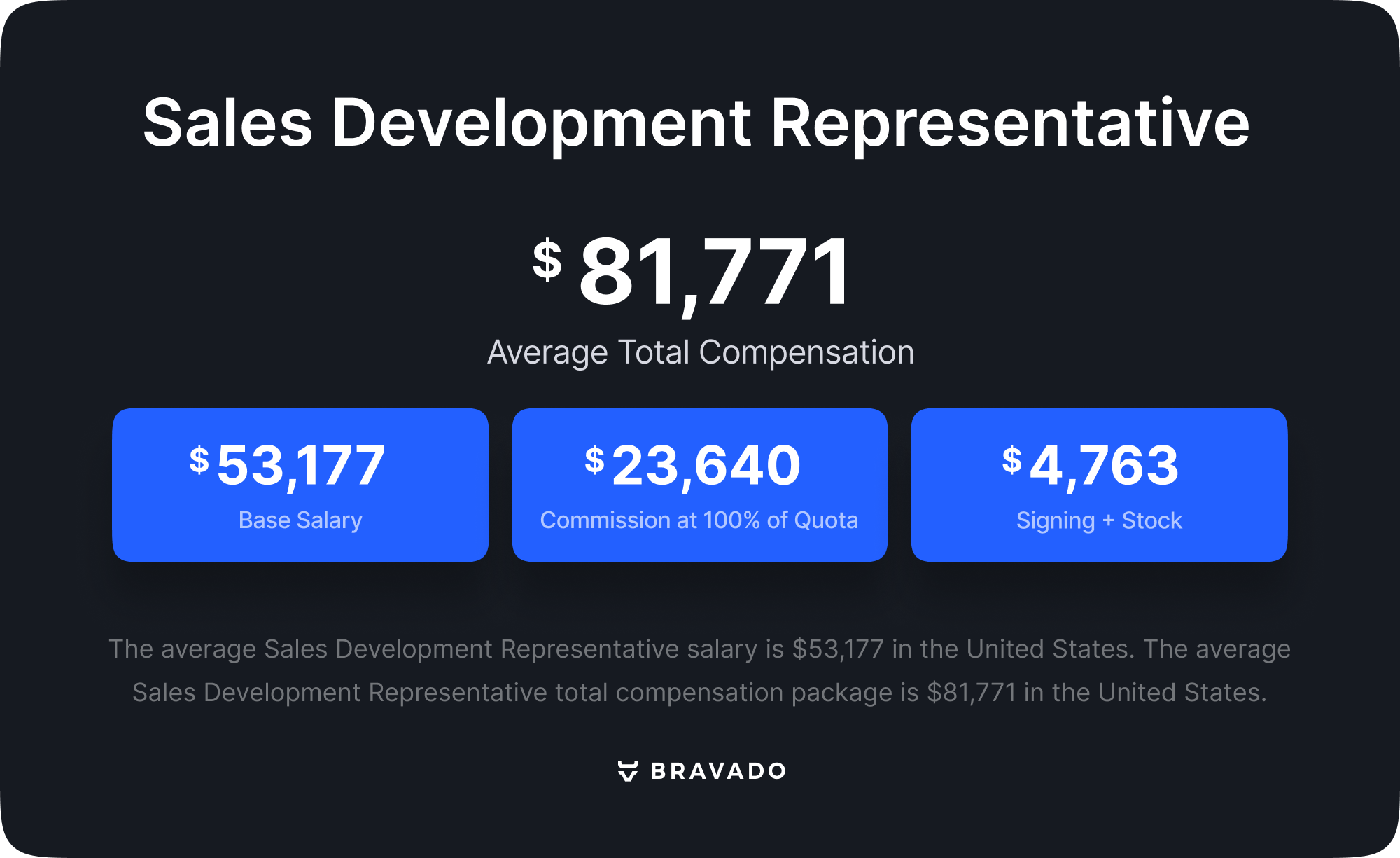
As of mid 2022, the average SDR can take home roughly $81,000 as the full extent of their base and comp package. That’s assuming they hit 100% quota. While certainly not particularly impressive, SDRs can have a wide latitude of compensation depending on their past quota attainment and their industry experience. Some SDRs take home well into the six figures, although this is by no means common.
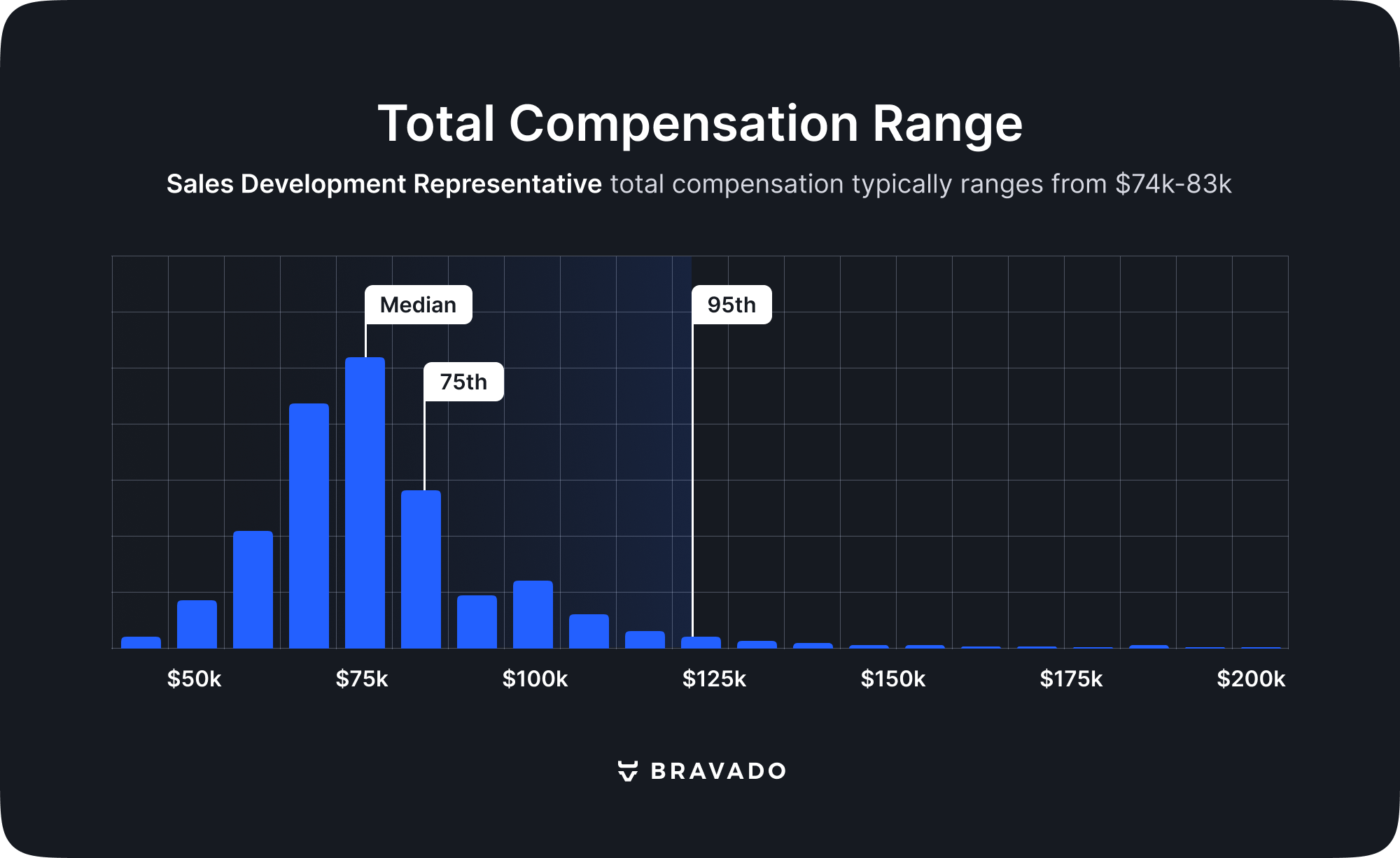
This data might seem discouraging, but ultimately, it’s just a reflection of self-selection. You might look at this and go ‘SDRs don’t make very much money,’ but really, they can, it’s just that the ones that perform well enough to frequently hit 100% quota don’t stay SDRs for very long. That’s because the real money’s in an account executive role or other senior role.
Account Executive comp
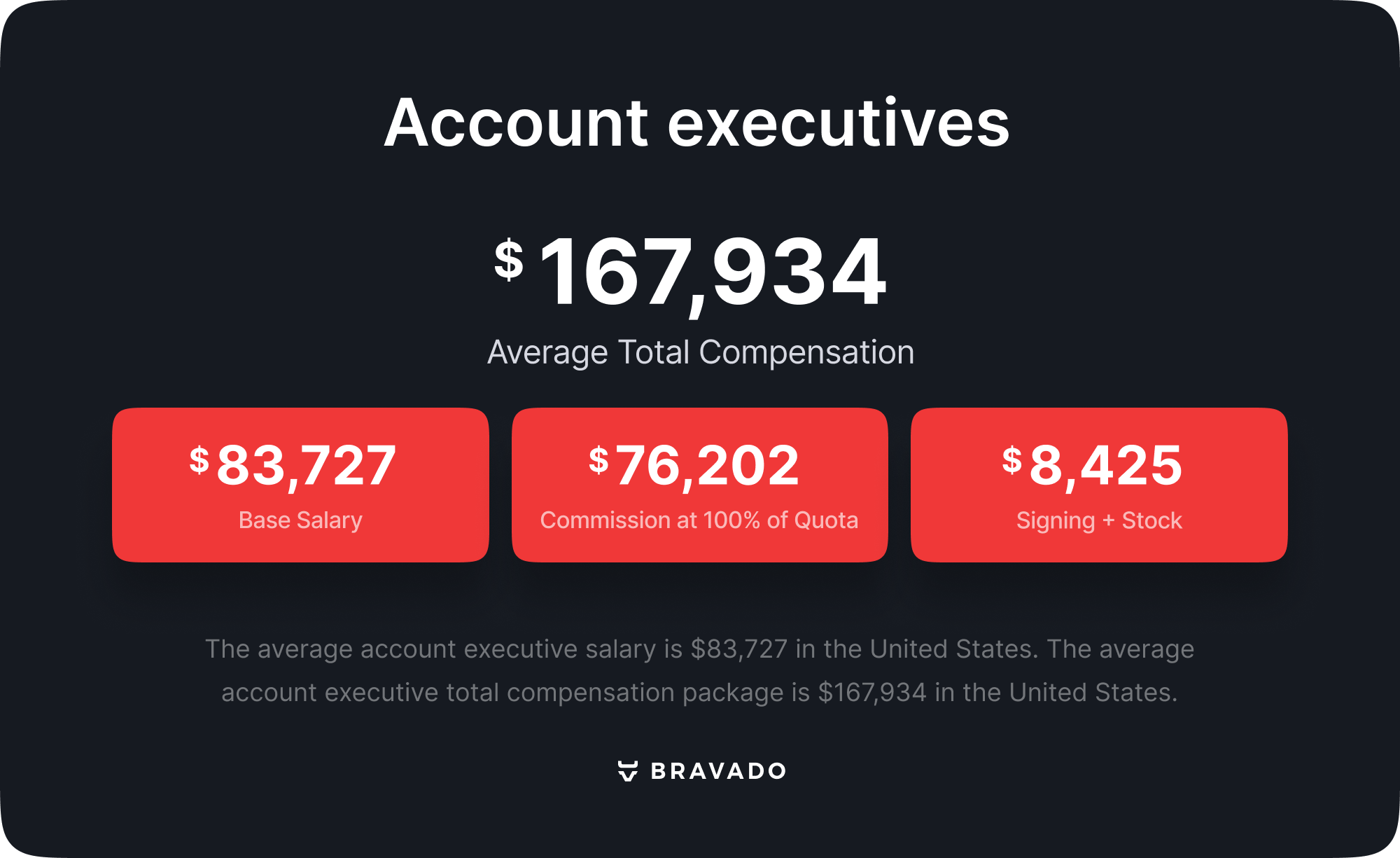
In the past year, account executive comp has soared. Account executives have more leverage than SDRs, a more tangible claim to an effect on revenue, and ultimately, are in shorter supply, so they get paid a lot. As of mid 2022, the average account executive took home $176k.
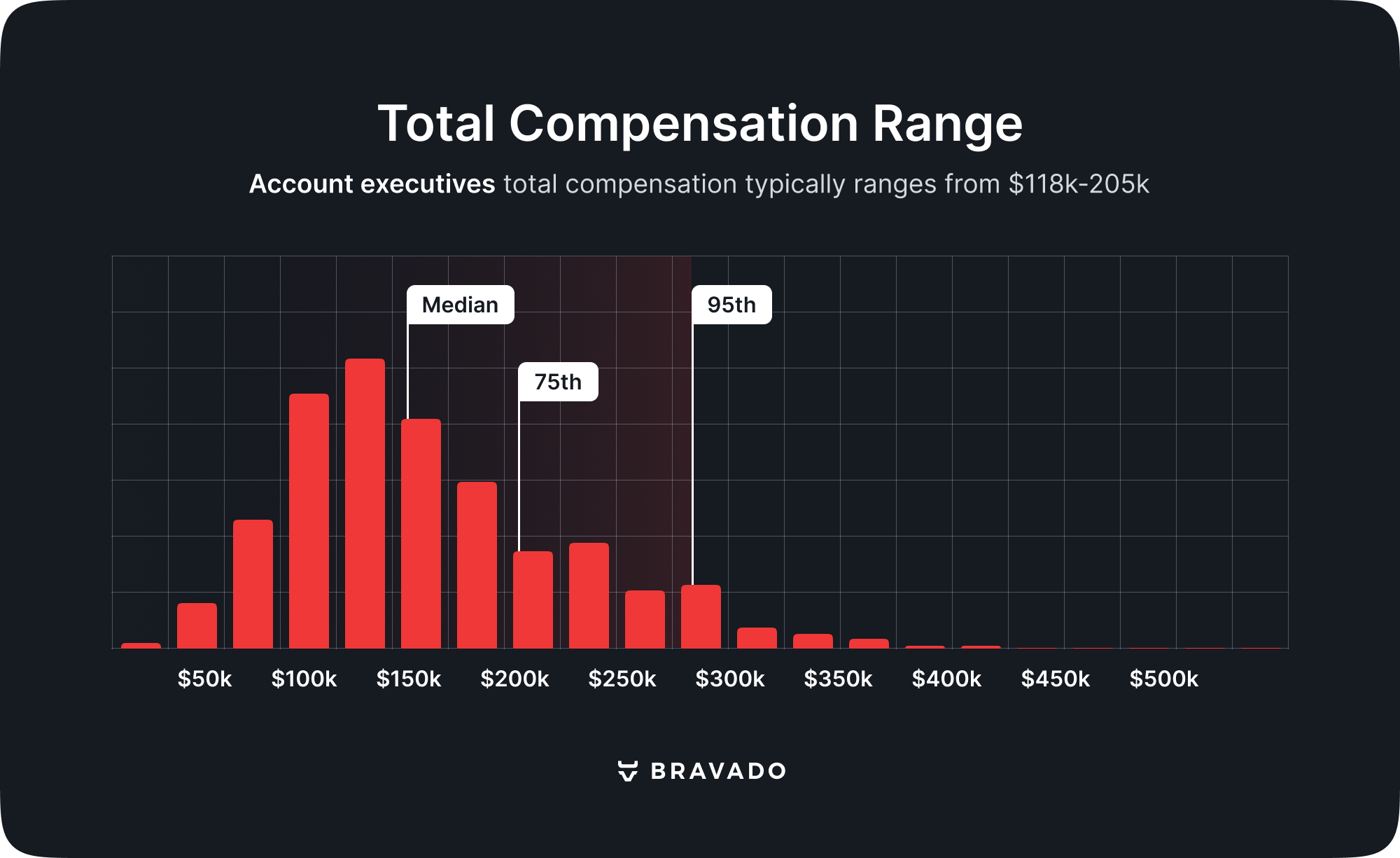
When it comes to AEs however, averages aren’t particularly useful. Ultimately, what matters is a myriad of factors including deal size, industry, and history of quota attainment. Pay as an AE is much more of a salary negotiation than other roles in sales, as a good AE is incredibly valuable, but the precise dollar amount is ultimately a deal to be negotiated. Suffice it to say though, if you’re an AE in enterprise tech, you’re probably doing just fine.
Places to Find a Sales Job
1. Your network
The best place to find a sales job in 2022 is, as it has always been, through building a professional sales network. Not only does finding a job through a contact strongly improve your chances of landing a role at a company, it also gives you a unique perspective into how the company works, as well as whether you want to work there in the first place.
When you’re beginning your job search, build a list of every contact you have at companies you might want to work for. If you’re applying for a job, use Linkedin to find out if any of your connections have history with that company. Methodically work your way through your contacts, asking informed, thoughtful questions, inquiring about open roles, and asking if they could give you a referral.
Ultimately, in the sales job hunt, your network is your most powerful tool for securing a role. For this reason, it’s also crucial to nurture that network as you undergo a job search. Send thank you notes after sales job interviews, as well as for any favor members of your network do for you along the way. Even if an interview at a company doesn’t pan out, you’ll be surprised by what a good impression can do for your career down the line. Some managers will even help you find a job elsewhere!
Be gracious, be humble, and be relentless and you’ll find your dream job in no time.
2. Social Media
In a post-Covid era, we’re more digitally connected than ever. So it’s no surprise that many young sales professionals are flocking to social media to build out their personal brands and make connections that help land them their dream jobs.
But it’s important to choose the right social website for you and your industry. Ask yourself, ‘What digital channel does my sector traditionally do best on?’ For example, if you’re in tech sales you’ll find that sites like Instagram and TikTok have a large number of influencers making waves and networking. If you’re in a field like healthcare, however, a more traditional social media site like LinkedIn or Facebook are excellent for crafting engaging posts and connecting with esteemed peers in the industry.
A website like Hootsuite is a great way to research this data, but one free option is simply searching different hashtags that are relevant to your field. If your background is in saas, simply searching “#saas” on a social site will give you a view into how many people are discussing your industry in a given moment. This also shows you the topics that people are engaging the most with which you can then use to inform what you post about.
For example, if you find many people talking about “selling software in a recession,” making a video or post on that topic and adding the right tags will drive up your profile’s engagement and, ultimately, your following. As your visibility rises, you’ll find yourself in more exclusive circles with other sales influencers who may be able to point you in the direction of your dream job.
3. Recruiters (with a caveat)
Recruiters can also be a valuable tool in the arsenal of your sales job hunt, but this comes with a special caveat. Sales recruiters are financially incentivized to get you hired, but that’s about where their financial incentive ends. This is great because sales job recruiters want to get you a job, and will do a lot of the legwork of communication for you. Just make sure that at every step of the process you’re making sure the companies you’re being sold to are companies you’d be happy to work at.
Of course, if you want to skip the job vetting process altogether, we hear there *might* be a sales jobs platform that vets all employers for you, ensuring they have great comp, culture, and product market fit and allowing you to skip the phone screen altogether. Just a little rumor we heard, take it with a grain of salt.
Additional Advice
Mastering the sales job hunt takes some salespeople years, and there are too many nuances and aspects of sales job hunting to cover here. Luckily, Bravado has a complete overview of several aspects of the sales job hunt not covered here.
Read “Nailing the Sales Job Interview” to understand the step by step tricks to making a great first impression, selling yourself, and closing on a new job.
Read “Negotiating your Base and Comp Package” to learn the pro tips and back-of-the-envelope math you need to get the most out of your salary negotiation.
Read “Negotiating Equity” to understand the universal frameworks by which startups value employee contributions in equity.
With that, you should be ready to kick off your sales job hunt confident that you understand the game, you understand the playing field, and you’re ready to close. Happy job hunting.






